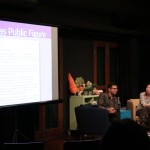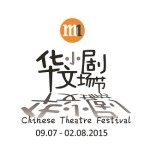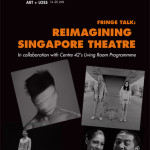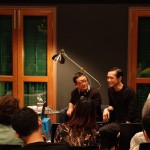Veteran arts manager Juliana Lim chatted with students from Singapore Management University’s (SMU) ACM301 Cultural Policy and Practice class, about cultural policy in Singapore. The students also presented an exhibition of their research on the evolution and influence of cultural policies on present-day practices. The 120-minute Living Room Chat has been repackaged into a 2-part video recording.
Join Juliana Lim as she chats with students from Singapore Management University’s (SMU) ACM301 Cultural Policy and Practice class, about cultural policy in Singapore. Juliana is a veteran arts manager with over 30 years’ experience in arts management, policy-planning and grant-making in the Singapore Government and other organisations. Juliana and the students will discuss the early years of cultural policy formulation and implementation in Singapore, with focus on three areas: Esplanade – Theatres on the Bay, the Arts Housing Scheme and the Grants Scheme. There will also be a mini-exhibition showcasing the students’ research on the evolution and influence of these policies on present-day practices. In the Living Room with Juliana Lim is presented in partnership with Assistant Professor Hoe Su Fern, as part of the SMU School of Social Sciences’ Arts and Culture Management Program. EVENT DETAILS Admission price: Give-What-You-Can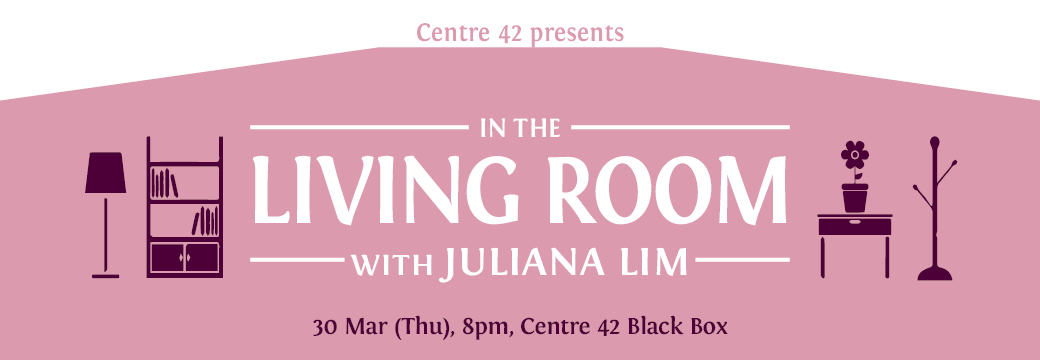
What is the role of cultural policy in Singapore? How does cultural policy translate into, and impact practice? What are the origins, functions and limitations of cultural policy in Singapore?
Thursday, 30 March 2017
8pm @ Centre 42 Black Box
(The exhibition starts at 7pm.)
Please register here
Juliana Lim
Juliana started her career in the Singapore Government Administrative Service in 1973. Since then, she has had over 30 years’ experience working in Government and Government-linked organisations, including 17 years in arts management positions and 18 years in arts, sports, charity and community grant-making positions. Some of her notable cultural policy-related projects include the formulation of several arts assistance and arts granting schemes including the Arts Housing Scheme and the Theatre-in-Residency Scheme, the development of The Esplanade: Theatres on the Bay, and the devising of the Heritage Link Project which resulted in the conservation of heritage buildings into several museums. Today, she continues to have an active interest in the arts and volunteers for various arts projects. As current President of the Richard Wagner Association (Singapore), she was most recently involved in the production of The Flying Dutchman (2016), the first Wagnerian opera to be produced and staged in Singapore.
Hoe Su Fern
Su Fern is Assistant Professor and Assistant Program Lead of the Arts and Culture Management Program at SMU. She holds a PhD in Culture and Communication from The University of Melbourne. Her current research areas include arts and cultural policy studies, urban cultural economies, arts spaces and creative placemaking. She is exploring diverse ways to pursue practice-oriented and engaged research on the arts, and is also passionate about catalysing robust and collegiate discourse on issues related to the arts and culture in Singapore. Recent projects include principal investigator for “Breaking Ground: The Impact of the Arts Housing Policy on Arts Development in Singapore: 1985 – 2015”, researcher for The Co-Op Experiment by The Substation, convenor-producer of the Singapore Biennale 2016 Symposium, and researcher for Between the Lines: Rant & Rave II, a verbatim theatre on the evolution of Singapore’s literary scene. Prior to her current position, she held appointments at The Institute of Policy Studies, the Ministry of Communications and Information, and the Supreme Court.
ACM301 Cultural Policy
ACM301 is a new course offered by Assistant Professor Hoe Su Fern as part of SMU’s Arts and Culture Management Program, with almost 40 students for the 2017 intake. For their final assignment, they are required to work in groups to produce an investigative project on the role, evolution and influence of some of the policies that Juliana Lim has been involved in. Questions that they have been exploring include: what is the relationship between the state, arts and society? How does cultural policy translate into, and impact practice? What are the origins, functions and limitations of some of the existing cultural policies in Singapore? For most of them, this will be the first assignment with a public-facing component and they have been working extremely hard to fulfil the assignment components, which include conducting live interviews, sourcing and piecing together archival research, and exhibition design. They are also grateful to Centre 42 for the kind opportunity and look forward to meeting everyone on 30 March!
Part 1: In the Living Room with Juliana Lim
Juliana and the students discuss the early years of cultural policy formulation and implementation in Singapore, with focus on three areas: Esplanade – Theatres on the Bay, the Arts Housing Scheme and the Grants Scheme.
Part 2: In the Living Room with Juliana Lim
Juliana and the students field questions from the audience.
Source: Centre 42 Facebook


